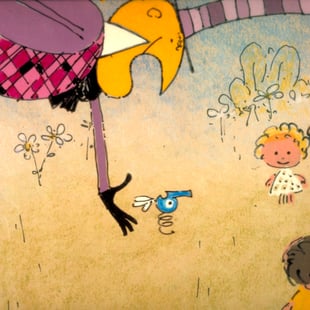Back
World Festival of Animated Film – Animafest Zagreb is dedicated to short animated film this year. Its 20th edition is held 1-6 June in Zagreb cinemas Europa, Tuškanac and Movieplex. Through various thematic programmes, this year the Animafest presents the impressive 450 films from 40 world countries. In addition to four competition programmes and three panoramas, this year’s festival includes a series of special film programmes and events.
The programme entitled Masters of Animation traditionally presents works by renowned animated filmmakers. This edition of the festival will provide Croatian audience with an insight into the works of three animation virtuosos: Frédéric Back, Karel Zeman and Jacques Drouin.
Frédéric Back is an internationally acclaimed and renowned Canadian artist, caricaturist, educator and activist, a winner of a host of international awards, four-time Oscar nominee and twice the winner – for his films Crac! and Man Who Planted Trees. His overall work consists of nine films; critics call them masterpieces of animated art. All of them are inspired by themes such as environmental protection, evolution, Quebecoise social heritage and Native American legends.
Back is one of the most important international ambassadors of Canadian and Quebecoise culture. The main quality of his work is relentlessly strong social involvement. Even though he uses diverse techniques, his works are recognisable by his crayon on acetate background technique, providing his drawings with a characteristic blurry appearance. The Masters of Animation programme includes a retrospective of Back’s films. The Animafest Council decided to present him with the 2010 Lifetime Achievement Award.
The second “master of animation” sharing the same programme is Karel Zeman – celebrating 100th birthday of this pioneer of Czech animation, the Animafest presents an overview of his work. Karel Zeman’s debut film was Christmas Dream in 1945, combining live action and puppet animation. This film reflects Zeman’s fascination with movement and its communicative and emotional potential. The film won the best animated film in Cannes, which marked the beginning of Zeman’s professional career in animation, as well as international fame.
His first independent project, a popular series of short animated films featuring a character named Mr Prokouk deals with everyday problems in a humorous manner. In addition to short films, Zeman’s work includes a large number of award-winning feature animated films. In the late 1950s, Zeman began developing a new genre, combining actors with artistically styled background using special technologies and animation. This genre is best depicted in his film An Invention of Destruction, transferring the spectators into the extraordinary and fantastic world of the French writer Jules Verne. Zeman’s work crossed the boundaries of current visual possibilities of film, enriching Czech animation with new visual forms, humour and invention.
Jacques Drouin is the third “master of animation" – this Canadian filmmaker has spent the last 30 years experimenting with specific, demanding and rarely used animation technique, the so-called pinscreen animation. The pinscreen, invented in the 1930s by animation partners Alexandre Alexeïeff (Russia) and Claire Parker (USA), aimed at creating an image akin to “engravings in motion”. The pinscreen is an unusual heap of thousands of moving pins on a metal board, lit from both sides. By pressing certain pins into the board, shadows become shorter, forming wanted shapes through a combination of longer and shorter shadows. Animators tend to avoid this technique because it requires tremendous amount of patience and yields no room for error. However, even though Alexandre Alexeïeff’s impact on Drouin was significant, he developed his own style by exploring the technique’s potentials.
The programme will present the film Jacques Drouin in Relief, a biographic documentary portraying Drouin from early childhood in east Quebec to a career at the Canadian National Film Board. Complete with numerous excerpts and unknown images from his personal collection, this film is a tribute to a lifetime work and a valuable lesson in film. Two of Drouin’s films will also be screened within this programme, representing examples of pinscreen animation technique in an exceptionally creative way.
In addition to these three authors, the Masters of Animation programme includes animated works selected by Luis Cook, as well as the already traditional overview of Croatian animation to the choice of Borivoj Dovniković Bordo.
Luis Cook, the author of The Pearce Sisters, the winner of the Grand Prix at the last short film Animafest edition in 2008, selected six remarkable animations, presenting seven acclaimed international animators: Koji Yamamura (Franz Kafka’s A Country Doctor), Tim Watts and David Stoten (The Big Story), Richard Condie (The Big Snit), Yuri Norstein (Hedgehog in the Fog), Mark Baker (The Hill Farm) and Jan Švnakmajer (Darkness, Light, Darkness).
The History of Croatian Animation is a biennial overview of the events occurred in animation 50 years ago. Selected by Borivoj Dovniković Bordo, this year's programme includes works made in 1960-1961. Six short animated works provide an insight into Croatian animation in the said period and include Croatian masters of the time, such as Boris Kolar, Zlatko Bourek, Borivoj Dovniković, Vlado Kristl, Ivo Vrbanić and Dušan Vukotić.



